Probablemente ya sepas que WordPress impulsa más del 43% de todos los sitios web de Internet. Es impresionante, pero no es el único sistema de gestión de contenidos (CMS) de código abierto que existe. Hay otras opciones que merece la pena explorar.
Cuando empezamos a crear sitios web, investigamos a fondo otras plataformas populares como Joomla y Drupal. Y aunque siempre hemos preferido utilizar WordPress para todos nuestros proyectos, entendemos que algunos de vosotros podáis estar buscando algo diferente.
En este artículo, vamos a comparar WordPress vs Joomla vs Drupal. Explicaremos lo que nos gusta y lo que no para ayudarle a decidir cuál podría ser el más adecuado para sus necesidades específicas.
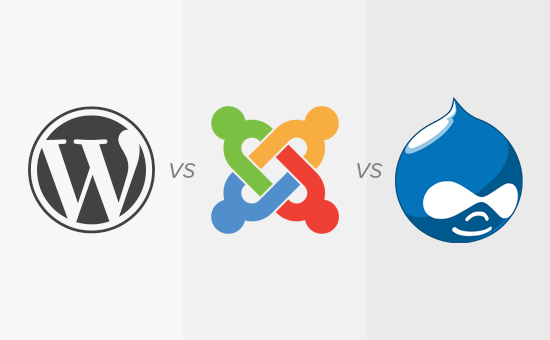
Nota: Estamos comparando WordPress.org y no el servicio de alojamiento WordPress.com. Consulte nuestra guía sobre la diferencia entre WordPress.org y WordPress.com.
Lo que es común en WordPress, Joomla y Drupal
Los tres CMS más populares de la web tienen mucho en común en cuanto a tecnología, filosofía y comunidad.
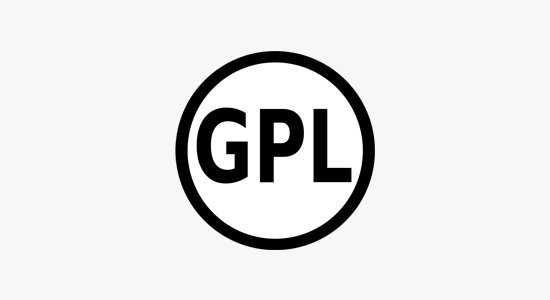
- WordPress, Joomla y Drupal son software libre y de código abierto con licencia GPL. Consulte nuestro artículo sobre por qué WordPress es libre para saber más acerca del software libre.
- Los tres están escritos principalmente en PHP.
- Todos ellos son compatibles con MySQL como sistema de gestión de bases de datos. WordPress solo es compatible con MySQL, mientras que Joomla y Drupal son compatibles con otros sistemas de gestión de bases de datos.
- Los tres utilizan temas y plantillas para la apariencia visual de los sitios, y plugins, módulos o extensiones para ampliar sus características.
- Como software de código abierto, todos son proyectos impulsados por la comunidad.
Aunque tienen muchas similitudes, son diferentes en muchos aspectos.
Por ejemplo, tienen políticas diferentes acerca de qué incluir en el núcleo del software, cómo gestionar los módulos y plantillas, cómo tratar la seguridad, etc.
Estas diferencias tienen un gran impacto en los usuarios y en cómo construyen sus sitios web.
Dicho esto, veamos cómo se comparan WordPress, Joomla y Drupal para que pueda elegir la mejor plataforma de maquetador de sitios web para su negocio.
Facilidad de uso y facilidad para principiantes
La mayoría de las personas que crean sus sitios web no son desarrolladores web, diseñadores o programadores. Son usuarios normales que sólo quieren crear un sitio web. La facilidad de uso es el factor más importante para la mayoría de los usuarios.
WordPress
WordPress viene con una famosa instalación de cinco minutos. La mayoría de los proveedores de alojamiento de WordPress también ofrecen la instalación de WordPress con un solo clic. Esto hace que sea bastante fácil para un nuevo usuario iniciar un blog o sitio web de WordPress en cuestión de minutos, no horas.
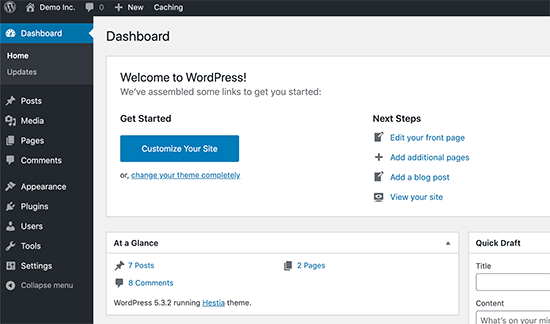
La experiencia de usuario tras la instalación de WordPress es mucho mejor que la de Joomla o Drupal. El usuario ve una interfaz sencilla y limpia con menús para crear entradas y páginas o empezar a personalizar la apariencia y los temas.
Joomla
La instalación de Joomla puede no parecer tan rápida como la de WordPress, pero tiene pasos muy similares. Además, muchos proveedores de alojamiento compartido ofrecen paquetes de instalación de Joomla con un solo clic.
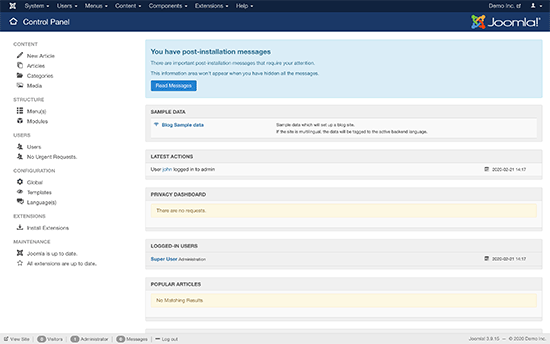
Tras la instalación, el usuario aterriza en un panel de control que no es tan sencillo como el de WordPress. Hay demasiados menús en los que hacer clic para personalizar el sitio.
Los fans de Joomla dirían que es porque Joomla es mucho más potente que WordPress, pero nosotros no lo creemos.
Drupal
La instalación de Drupal es similar a la de Joomla y WordPress. Basta con descargar y subir el paquete y ejecutar el script de instalación.
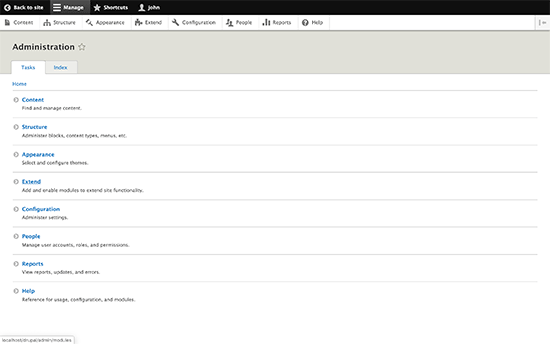
Drupal también ofrece distribuciones. Se trata de lotes de Drupal preempaquetados con módulos y configuraciones para crear tipos específicos de sitios web.
La experiencia posterior a la instalación para los principiantes es un poco complicada. Los usuarios encontrarán difícil averiguar cómo cambiar las cosas en su sitio. Drupal hace que sea muy obvio cómo añadir el contenido, pero cambiar la apariencia y añadir elementos que no son de contenido no es muy obvio.
Ganador: WordPress
Temas y extensiones
Estos tres populares CMS incluyen temas y plugins/módulos para ampliar las características y el aspecto del software.
Los temas controlan la apariencia de tu sitio web y cómo lo ven los usuarios. Los plugins o módulos son como aplicaciones para tu CMS.
Veamos cuál es el rendimiento de estos tres principales software CMS en esta categoría.
WordPress
WordPress permite a los usuarios cambiar la apariencia de su sitio utilizando temas. WordPress viene con algunos temas por defecto preinstalados.
En cualquier momento, puedes hacer clic en el botón añadir nuevo de tu página Apariencia e instalar temas gratuitos de WordPress desde el directorio oficial de temas de WordPress.org.

Aparte de los temas gratuitos, encontrarás muchos más temas de WordPress premium desarrollados por tiendas de temas de terceros como StudioPress, Elegant Themes, y más. Estos temas son de pago y vienen con opciones de soporte premium.
La verdadera potencia de WordPress reside en los plugins. Hay más de 59.000 plugins de WordPress disponibles de forma gratuita en el directorio oficial de plugins de WordPress. También puedes comprar plugins premium que vienen con soporte de pago proporcionado por los desarrolladores de plugins. Marque / compruebe nuestra lista de plugins imprescindibles de WordPress para ver cómo los plugins hacen que WordPress sea increíble.
Joomla
Al igual que WordPress, Joomla viene con plantillas y extensiones. Estas grandes extensiones pueden hacer casi cualquier cosa, desde la creación de una tienda de comercio electrónico para gestionar el correo electrónico.
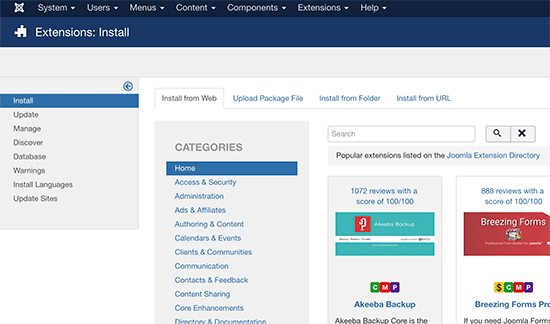
Sin embargo, la cantidad de estas plantillas y extensiones no es tan alta como la de WordPress. Esto podría hacer que encontrar la plantilla perfecta y las extensiones perfectas sea un poco difícil.
Por defecto, Joomla no tiene una característica que permita a los usuarios buscar e instalar extensiones o plantillas desde el área de administración. Hay una extensión que le permite añadir una característica de “instalar desde la web” para las extensiones. Pero para las plantillas, los usuarios todavía tendrán que buscar manualmente las plantillas y luego instalarlas añadiendo su URL.
Drupal
Drupal tiene el mismo problema con la disponibilidad de temas y módulos. Los usuarios tendrán que salir de su sitio, buscar el módulo y el tema que desean añadir y, a continuación, localizar la URL del archivo zip del proyecto. Por último, pueden introducir la URL en la página Módulos o Temas para instalarlos.
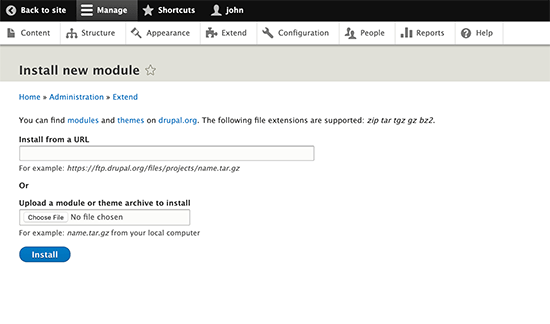
Hay módulos para hacer casi cualquier cosa, y se añaden nuevos con regularidad. Aun así, la cantidad total de módulos es inferior a la de WordPress.
Ganador: WordPress.
Opciones de soporte técnico
La disponibilidad de opciones de ayuda y soporte es muy importante para los usuarios principiantes. Seguramente habrá algunos obstáculos cuando estés probando un nuevo software. No pasa nada siempre que puedas obtener ayuda.
WordPress
WordPress cuenta con una sólida comunidad de usuarios. Puedes encontrar ayuda sobre WordPress en los foros oficiales de soporte, documentación, manuales, codex, canales de Slack, Stack Exchange, el grupo de Facebook WPBeginner Engage y en casi todos los foros de Internet acerca de diseño y desarrollo web.
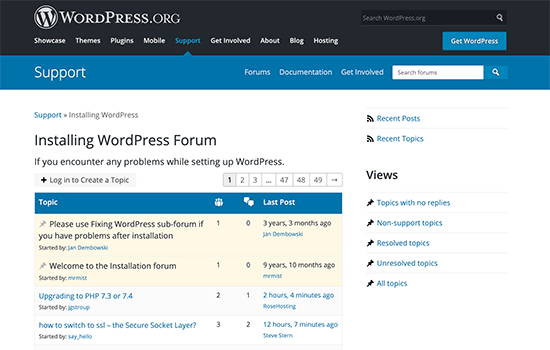
Hay sitios como WPBeginner, que contienen cientos de tutoriales, videotutoriales y artículos dirigidos a usuarios de WordPress de nivel principiante. Hay muchas formas de solicitar soporte gratuito para WordPress y obtenerlo.
Aparte de las opciones de soporte gratuito, también hay formas de obtener soporte de pago para WordPress.
Plataformas online como WPBeginner Pro Services, Seahawk, Codeable, Upwork, Fiverr, etc. son sólo algunos de los lugares donde puedes contratar a profesionales de WordPress para que te ayuden.
Debido a la inmensa popularidad de WordPress, encontrar desarrolladores de WordPress es fácil y asequible para pequeñas empresas y particulares.
Joomla
Joomla, al igual que WordPress, cuenta con una comunidad grande y muy útil. El sitio web de Joomla tiene una amplia documentación, que es un recurso valioso para los principiantes. Para un soporte más interactivo, los usuarios pueden unirse a foros, listas de correo, grupos de usuarios, etc.
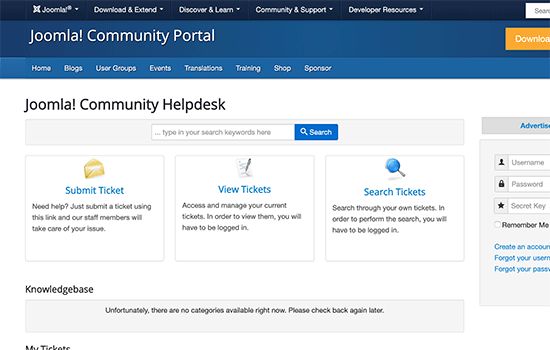
Aparte del apoyo de la comunidad, hay recursos de terceros, formación de pago y agencias de desarrollo que pueden ser útiles.
A diferencia de WordPress, encontrar ayuda asequible de expertos es bastante difícil para Joomla. Contratar a un desarrollador o experto para el desarrollo de Joomla, diagnosticar problemas o asistencia puede costar mucho más que WordPress.
Drupal
Drupal cuenta con una comunidad de aficionados y usuarios muy proactiva. Al igual que WordPress y Joomla, encontrará todas las opciones de soporte de la comunidad para Drupal. Hay una amplia documentación, un foro de soporte, listas de correo, grupos de usuarios y salas de chat irc, todos buenos lugares para obtener asesoramiento y ayuda gratuita.
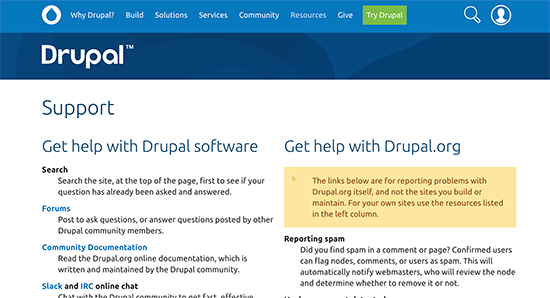
Drupal intenta poner en contacto a los usuarios con desarrolladores y empresas que ofrecen servicios profesionales de Drupal. Puede encontrarlos en Drupal Marketplace.
Sin embargo, los desarrolladores de Drupal, al igual que los de Joomla, son muy caros en comparación con los de WordPress.
Ganador: WordPress
Localización y soporte multilingüe
Un gran porcentaje de los sitios web que se crean cada día no son en inglés o son sitios multilingües. Es mucho más probable que muchos principiantes probablemente busquen un CMS que pueda manejar varios idiomas o que sea compatible con diferentes configuraciones regionales e idiomas.
WordPress
WordPress ofrece una excelente plataforma para crear un sitio multilingüe. No es compatible con múltiples idiomas fuera de la caja, pero hay algunos excelentes plugins que le permiten crear fácilmente un sitio multilingüe de WordPress.
WordPress está disponible en más de 57 idiomas. Se pueden instalar nuevos idiomas con sólo hacer clic desde el área de administrador de WordPress.
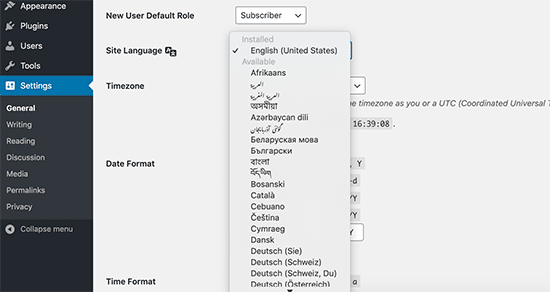
Los temas y plugins más populares también están disponibles en varios idiomas, y los desarrolladores de temas y plugins buscan activamente ayuda para traducir sus paquetes a otros idiomas.
Todos estos esfuerzos hacen de WordPress una gran plataforma para crear un sitio web multilingüe o en otros idiomas.
Joomla
Joomla viene con la capacidad fuera de la caja para manejar un sitio web multilingüe sin necesidad de instalar ninguna extensión. Simplemente vaya a la gestión de idiomas, añadir un idioma de contenido y empezar a crear contenido multilingüe en su sitio web.
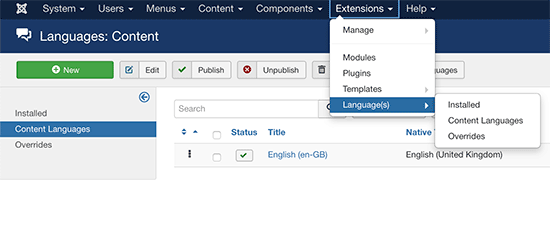
También hay traducciones disponibles para la interfaz de administrador en muchos idiomas, que pueden instalarse fácilmente desde el área de administrador.
Drupal
Drupal es compatible con / dar soporte para manejar no Inglés o sitios multilingües. Deberá activar los módulos de configuración regional y de traducción de contenidos. A continuación, puede añadir los idiomas del sitio y de la interfaz de administrador desde la sección de configuración de Drupal.
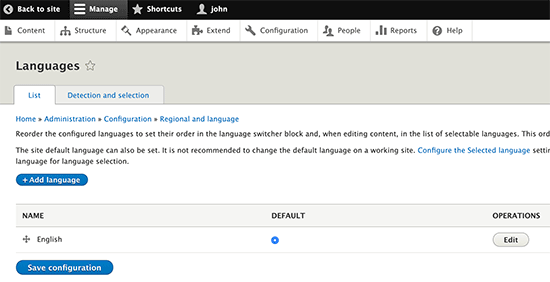
Ganador: Empate – Los tres son compatibles con sitios multilingües y están disponibles en varios idiomas.
Seguridad
La seguridad es un factor muy importante a la hora de elegir un CMS para su sitio web. Casi todos los sitios web de Internet son vulnerables a las amenazas de seguridad.
WordPress
Al ser el CMS más popular del mundo, los sitios web basados en WordPress suelen ser objetivo de los piratas informáticos. Sin embargo, WordPress se basa en un código muy seguro y responde a las vulnerabilidades de seguridad con gran rapidez.
WordPress también dispone de un mecanismo de actualización automática que permite que los sitios web de WordPress se actualicen automáticamente cuando se publica un nuevo parche de seguridad.
Los sitios de WordPress pueden protegerse aún más con copias de seguridad automáticas, autenticación de dos factores y otras prácticas recomendadas de seguridad de WordPress.
También existe un mecanismo integrado para mostrar las actualizaciones de temas y plugins de WordPress. Esto permite a los desarrolladores de temas y plugins responder rápidamente a cualquier vulnerabilidad de seguridad.
Joomla
Joomla es muy similar a WordPress en lo que respecta a la seguridad. Responden activamente a cualquier vulnerabilidad de seguridad y son muy rápidos en parchearla. Sin embargo, el mantenimiento de un sitio web y la instalación de actualizaciones sigue dependiendo del usuario.
Hay extensiones disponibles para hacer copias de seguridad de tu sitio Joomla. También puedes reforzar la seguridad de tu sitio Joomla siguiendo las mismas buenas prácticas que WordPress.
Drupal
Drupal se toma muy en serio la seguridad. Publican las vulnerabilidades de seguridad en su propio sitio a medida que las descubren y las parchean. Existe la percepción de que Drupal es más seguro porque no se oye hablar de sitios de Drupal que hayan sido pirateados con tanta frecuencia, pero eso podría deberse a que no es tan popular como Joomla o WordPress.
Ganador: Empate – Los tres siguen las normas de seguridad adecuadas.
Conclusión:
Drupal, Joomla y WordPress son fantásticos sistemas de gestión de contenidos. Drupal y Joomla vienen con muchas más características incorporadas que WordPress.
Sin embargo, WordPress les gana por su facilidad de uso, su enorme comunidad global, sus plugins y sus temas. Creemos que a la mayoría de los usuarios no desarrolladores les resultará mucho más fácil crear con WordPress que con Joomla o Drupal.
Con más de 59.000 plugins para WordPress, puedes añadir casi cualquier característica o crear el sitio web que quieras (sin escribir código).
Ganador absoluto: WordPress
Cómo empezar con su CMS favorito
Tanto si eliges WordPress, Joomla o Drupal, necesitarás un nombre de dominio y alojamiento web para crear un sitio web.
Por suerte, los tres principales software CMS tienen requisitos bastante similares, lo que significa que todas las principales empresas de alojamiento web son compatibles con ellos.
Recomendamos Bluehost o SiteGround. Ambas se encuentran entre las mayores empresas de alojamiento del mundo y están especializadas en alojar sitios web de WordPress, Joomla y Drupal.
Para más recomendaciones, consulte nuestra guía completa de alojamiento web para principiantes.
Si estás empezando con WordPress, consulta nuestra guía para principiantes sobre cómo crear un sitio web con instrucciones paso a paso.
Esperamos que este artículo le haya ayudado a comparar WordPress vs Joomla vs Drupal, para encontrar el mejor CMS para su sitio. Puede que también quieras ver nuestra comparativa WordPress vs Blogger o nuestro escaparate de sitios populares que utilizan WordPress como CMS.
If you liked this article, then please subscribe to our YouTube Channel for WordPress video tutorials. You can also find us on Twitter and Facebook.




mohadese esmaeeli
Certainly, I have no intention of getting involved in any CMS war. However, based on my experience (as I worked with Joomla for 3 years), WordPress can provide better feedback in any field for large websites. Typically, and proven, more than 60% of websites worldwide use WordPress, while less than 15% use Joomla. In general, WordPress has a beautiful world for itself. Of course, before choosing a content management system, we must consider the nature of the website. Still, given the amazing advancements that WordPress has made and the plugins developed by major global companies, WordPress can now be used for any type of website.
Jiří Vaněk
I tried all three editorial systems and from my own experience wordpress is good especially for beginners to learn how to work with the website and understand the basic principles. WordPress seems to me to be the most versatile and most importantly, in the event of a problem, it has a huge user base who are happy to help solve the problem for free.
Priya Sinha
Thanks for the post, nice information about WordPress vs. Joomla vs drupal which one is better… it is really helpful. I will recommend it to others.
WPBeginner Support
Glad you found our comparison article helpful!
Admin
Tom Hardy
Great information! Based on my experience, in my opinion, WordPress is the easiest content management system that is highly customizable. On the other hand, Drupal is complex, but it is best for creating advanced websites; it is also a very secure CMS. Joomla lies in between these two CMSs on customizability, ease of use, and security fronts.
WPBeginner Support
Thanks for sharing your opinion
Admin
Duane Hamann
I think this article is right. For the unskilled guy looking to set up a respectable managed website, WordPress is the best option. But it has limits that Joomla have overcome. For someone skilled in CMS development, Joomla rates #1 for it’s flexibility with custom developed components, it’s far more technical so to the guy looking for something decent and easy to understand, WordPress win. That however, doesn’t shine light on WordPress when compared to Joomla. All it says, for those with no developing skills, WordPress is the best. For those who develop PHP applications, Joomla is more adaptive and flexible, so it all depends on the individual skills.
Vast
I have created numerous sites and have used all three contenders. I find Joomla the most versatile and agile to use especially for larger complex sites.
But even for small sites, Joomla is super easy to use.
I think WordPress is more suitable for blogging and for commenting and it’s fine for smaller sites. It’s just not as easy to fine-tune as Joomla.
Ronald
if you want something not complex and limited for a web page use wordpress.
If you want something complex and not limited to developing websites use Drupal.
Drupal is better!
Okanime
How to know a guy “good with computers” posing as a web designer – when he tells you he will build your site with a wordpress CMS. If you find Joomla hard to use or maintain, seriously you should stop using any form of electronic device. It is your obligation to do us all that solid.
Mark
A website about WordPress says that WordPress is the best … What a surprise…
Jiten
I was using WordPress since 2010. Being a web designer I always design and deliver website in WP but some years before some wabsites got hacked. Remember once your website hacked there is only one solution to remove infection completely “DELETE EVERYTHING” because once you attacked then no plugin will clear everything.
Now I’m switching from WP to Joomla.
Okanime
Joomla is beautiful. I don’t understand why it gets a bad rap. Joomla 3.x is now miles better than WordPress in every aspect.
Duarte
Comparing Drupal and WordPress is like comparing a car to a boat, or apples with onions. They both best in their own scope. Depending on various factors you should use one or another but this should be for another article.
I use both and for me one thing that WP is not so good are the plug-ins. It’s true that WP has thousands of great plug-ins, but most of them are repeated in functionality and others are fremmium, meaning you have to pay if you want the full product. Also they tend to be turnkey solutions with no scalability in mind. And the same happens with themes.
Drupal has a strict policy of non repeated contributed modules and they are all free (Open Source), no fremium modules or themes are allowed. The modules in Drupal are more like bases so you can develop your functionalities with your own code or with other modules. A good part of drupal modules don’t have visible outputs they only serve as backend connections between functionalities.
Can’t talk about Joomla. No experience in it.
Mark
While WP may have by far the biggest range of themes and plugins, most of their themes are pure repetitions and duplications, boring in general and created with very little creativity used.
The same goes with WP plugins. To make this even worse, you have to argue with an army of ross-blaming plugin developers, each of them assuring your broken website is the result of “another’ plugin installed, nothing to do with them.
Ever heard of the saying; “too many cooks destroy the dish”?
That applies a 100% to WP.
I’d never use WP, not even if it was the last remaining CMS on the planet. Full of bugs, incompatible plugins, huge security vulnerabilities, lifeless designs, and a million of incompetent code hackers all pretending they are “professional web-programmers”.
Sam
I totally agree with you.
Paul
I’ve never had any security issues with WordPress, and regarding “lifeless designs” – if you have the relevant skills (or hire a competent designer) the only limit to how your WordPress site looks is your imagination.
Stick with well established (and supported) themes and plugins, and you can’t really go wrong.
Bizzo
You can make a fairly nice looking website with WordPress, however what becomes evident fairly quick is that it’s a blog and it’s nearly impossible to get past that. If you want a blog, great! If not, it will take an enourmous amount of time and energy to tailor it to be something other than a typical blog.
By the way, someone mentioned WNBA being wordpress. Note, NBA.com is Drupal.
Nikola
I can agree that WordPress is most popular than Joomla, but not that is better.
The popularity of WordPress is due to negative campaign being waged against Joomla.
The internet is overflowed with articles like this one where some people talking absolutely lies and nonsense’s about Joomla.
Regards
Fred
For those who want to migrate from Drupal to WordPress, they can use the free tool FG Drupal to WordPress
PATRICK MUSUMINA M.
WordPress offers more use interface than Drupal and Joomla
Niels Klint
Absolutely wrong
Nikola
I agree.
Alex
Not for a client. We always develop custom themes using different CMSs and the clients always prefer WordPress to edit their site. Because it’s easier for them to understand due to the user interface.
Frank Yusuf
Wp is a good content management system it simplifies web design with it’s diverse themes and pluggins. in the past web design used to be a herculean task but with the coming of wordpress code became poetry.
greg
WordPress does an excellent job at offering a GOOD PLATFORM to build a MULTILINGUAL site. It does NOT SUPPORT multiple languages out of the box, but… Yes, awesome platform!
Rahul
wow… after reading this tutorial i should set up wordpress for my blog
waqas
i am using joomla and then yt frame works in joomla. i think for advance sites joomla is better due to ease in creating new module positions and other customizations with themes and modules as well. although for small blogs wordpress is better. but in joomla if you are pro i think you can create even more good blogs in joomla
Joris
I agree, thousand more options for many different blog types on one site without any coding. Try that in wordpress and you need to create multiple themes or use pagebuilders.
For wordpress you need allot more knowledge for customizing settings in blogs.
Out of the box and media is wordpress i winner. Multilingual is not in wordpress and WPML is a pain in the ass
Darren
I’ve used a number of CMS’s over time and by far the worst one I ever found was WordPress. I’m very surprised that it came up top and even more surprised that it came up high for security.
I’ve found a number of stupid security issues with wordpress – for example if you don’t know what your doing and build a site someone can easily add some GET variables to the end of WordPress sites and easily use that to retrieve the username of the site owner – ok the password is still hidden but any hacker is half-way there.
I normally use Joomla for web design as I find it easy, but then again I spent many years learning C++ at University and have converted that knowledge into PHP.
As for Drupal, I’m just learning bits of Drupal at the moment and I have to admit some bits of it look really good. The only bad thing I find is the cache when trying to design a template the cache does get in the way a bit. Also it seems strange to have sub-themes off from main themes.
I recently came across a nightmare with the adaptive theme as I wanted to modify the menu code slightly, so I copied what I thought was the menu code (it was adaptivetheme_menu_tree and adaptivetheme_menu_tree (you’d guess that is what makes the menu seeing as it’s title contains the word MENU!!)), it turned out to do nothing – I don’t even know what that section of code does. Instead I found it mixes the primary menu up with adaptivetheme_links which is also used by multiple other functions – and there wasn’t even any proper way to split them so I had to figure it out by querying what the heading ID is and if it’s primary_menu it must be the menu I’m after.
Unfortunately though I’m in a company that has a website based on Drupal and thinks Drupal is the best thing since sliced bread so I have to try and work with it. Hopefully the more I use Drupal the more I’ll figure it out – I’ve already created a shortcut link to the sites/all folder as that was bugging me having to go through all those directories just to get to where I can edit (in Joomla it’s just straight in, into the templates folder and you’ve got all your themes and overrides waiting there for you!)
Heidi
Hi Darren. It sounds like you’ve got a great deal of Joomla experience and this is a bit off-topic… However, I’ve got a Joomla 1.5 site that needs to be updated to a responsive theme for a nearby non-profit. I’m more of designer than a web programmer. Any suggestions on the best way to do this — or any suggested do’s and fonts before I get started?
Thank you.
Syahir Roslan
As far as my experienced with Joomla, it’s really hard if you’re upgrading from Joomla 1.5 or 2.5, it’s not impossible but it will succeed with many errors so i’m suggesting that it’s best to migrate the content and use the latest Joomla as its support more responsive themes and modules. And also WordPress is the worst and didn’t try out Drupal yet.
Darren
Hi Heidi
I’ve not used Joomla 1.5 in many years, most of my sites are based on Joomla 3.x as that is possibly the most responsive of them.
Your best bet if you want to make a site more responsive is to look into the Boostrap API and include Bootstrap CSS as quite a lot of responsive menus and columns can be created with bootstrap and they automatically convert to look good on both mobile phones and desktop screens.
As for going from one to the other – I would strongly suggest making a backup of your entire site before starting (including the SQL database), and maybe building the new site in a test location first before over writing the existing site (for example create it in a temporary folder first, make sure it all works and then move the site to the main folder – and don’t forget to change configuration.php with the new location details – and if you’ve used a different SQL server change the SQL server details too in configuration.php although if you just built it in a separate folder on the same host the SQL settings shouldn’t need altering).
Also look at using the latest edition of Joomla – at present that is 3.6.2 – as that gives you the latest version with the latest security issues fixed and future upgrades should be easier, as of Joomla 3 they have made the upgrading process quite simple and easy to retain existing data, but going from 1 to 3 may mean you’ll have to copy and paste most of the original site if you want it to have the same data.
Scott...
Of course WordPress came out on top, its a WordPress beginner site, you didn’t really expect the review to be objective. It’s basically a sales pitch where only the good points are elaborated.
Brian
I use both WordPress and Joomla for a long time now and Joomla, while having some nice features over WordPress, suffers heavily from the lack of good extentions (esp. free ones). Sometimes it takes me hours to find the right one and make it work which never happens in WordPress where I can search and when I find, there is a good support and documentation for it. Not to speak that some features don’t work so well in Joomla, like uploading pictures to gallery can be a real pain. Therefore, making a Joomla site look and work the way you want is more a matter of luck than effort, however, when you get there, it works well, even a bilingual support is great. Also, using publishing extentions like K2 can complicate things, a lot. I’d definitely recommend WordPress to beginners and Joomla to more advanced users and experienced website designers.
Niels Klint
“Therefore, making a Joomla site look and work the way you want is more a matter of luck than effort, however”
Absolutely wrong – but the more opportunities there are in a system, the more you must be able to exploit the opportunities
Petr
I use to build sites with WordPress and Joomla! but mostly when I finished website built with WordPress, client asked for some new specific feature which was not easily implemented in WordPress (sometimes it was not possible) so then I reworked the site in Joomla!. Even WordPress is popular, simple and easy I mostly use Joomla! because of its complexity and option to easily and powerfully customize the code (as there are great and modern code techniques which can be easily extended). But I like them both – WordPress for really simple websites (blogs) and Joomla! for complex websites.
bill
You said “Almost every website on the internet is vulnerable to security threats.”. I would say you should revise that statement and say EVERY website is vulnerable to security threats. If it has an IP address, than it’s vulnerable.
Bucur
I’ve used all big three systems (WP, Drupal and Joomla) in a corporate (big) environment.
From a *user* point of view, I hated Drupal with the heat of a thousand suns. I found it clunky, restrictive (and not in a good way) and just plain bewildering at times. Of course, I admit I was biased coming to it because I’d already used J! and WP extensively and also another “real” enterprise CMS and was expecting a similar experience.
And, as a someone who used to work for a govt dept that adopted Drupal – it wasn’t because it was secure, it was because “the White House uses it” and it was “free”, and both those reasons are so flawed they are silly. *eye roll*.
After my experience using Drupal on big internet and intranet sites, I would never consider using it seriously again. Out of the box and even after extensive modifications and add-ons, it couldn’t do timed publication, you couldn’t work on a draft version of a page (and save the draft) and so many other niggly user end problems that it just made my website life miserable.
After using WP for the last few years though, it’s my go-to system for publishing sites, mainly because it is so easy to teach other (non-technical) users how to use it and security can largely be addressed if a bit of care is taken from the beginning.
Paddy
Hi, I’ve been a front/backend programmer for for personal projects for years -and I’m now thinking of starting to create websites for clients. Allowing ‘non techies’ the ability to update the websites after delivery is all a bit new to me. It only really started to sink in after making a website for a friend and her casually saying ‘how do I update it?’. I am right in assuming that WP, J! and Drupal are suitable for professional website delivery for clients? If it’s partly a case of them being free, are there any others that you would recommend to use, albeit at a cost?
K Johnson
Hmm… a site called wordpress beginner declaring wordpress the winner in every category except one. Not very objective IMO.
Brooks
When you look at functional scalability and the architecture of each of the reviewed products, there is no comparison. None.
WP was initially designed as a simple blogging tool, and was then revised to handle CMS-like features:
– The various popular plugins to handle basic editing, structure and extended CMS features frequently overlap and conflict with each other.
– The structural scalabiity of WP pages and blogs is a function of plugins, not the underlying WP architecture.
– It is painfully apparent that a lot of the admin, design, etc. features of WP were added after-th-fact. The underlying blog-centric architecture makes it very difficult to add CMS capabilities in a way that is intuitive.
Drupal, on the other hand, was designed from the bottom up to scale functionally. The obvious trade-off is the learning curve.
But, in my experience, the lost productivity working with WP’s weak architecture (esp when attempting to implement more complex functionality) or dealing with conflicting 3rd party components, exceeds the Drupal learning curve.
So, perhaps a better qualifier when doing this comparison would be:
– If you need a simple blogging tool, WP is probably the most appropriate.
– If you need a robust CMS tool, then Drupal is the most appropriate.
IMO, Joomla is a compromise solution – not the easiest for basic blogging and web design, but not the most robust for CMS functions.
Just sayin…
Keith
The problem I’ve too often experienced with WordPress is that, while it clearly has more plugins than the others, so many of them, even premium ones, are developed with a ‘yeah, this sort of meets the requirement’ mindset, and ‘If they want something to do what they really want, they’ll have to pay us more money.’ I see this time and again with a current WordPress/WooCommerce solution I’m working on for a client. They want it in WordPress. I’m going to give it to them in WordPress, but it shouldn’t be this frustrating.
Mustafa
Thanks for this comparison very useful.
Edujobsbd
I think WP is better than three.
SREERAJ
Thanks for the article.
I really forced to add this comment, WordPress is WORSE in terms of security and clearly Drupal is the winner there.
Vladus Wizard
Hello. This article is subjective opinion of author. All of that CMS have pluses and minuses. I noone can answer this question of what CMS to use. It depends on specific case.
Fordiy
For professional purpose, must be Joomla. I was so disappointed when I first install wordpress. Actually wordpress is NOT good for commercial site.
Atanas
Why?
Mervink
Interesting, why would you say it’s not good for commercial use, I mean, A lot of digital agencies would prefer working in WP, despite the security factor I really don’t mind using it for commercial purposes
Amanda
If I may, although I am not the most experienced user, I’ve done my research and, as had been pointed out in other comments, WordPress was designed to be a blogging tool and nothing more. It was NOT intended for commerce. They now have plugins to make up for that lack of functionality, but to compare that to a CMS that has that functionality right out of the box, such as Drupal or Duda, WordPress is obviously going to lose. Of it requires an extension, it is nearly a guarantee that it simply won’t work as well as if it were part of the base coding. There are indeed a lot of commercial sites that use WordPress, but as another commenter is experiencing, that is often because it was requested by a business owner who doesn’t know any better and it makes life considerably harder than it needs to be for the developer. Will the developer be ABLE to make a commercial site with WordPress? Certainly. Will it be as easy as it should be? Probably not (though, once you’re used to it, it likely won’t seem like a big deal, especially if you haven’t used another CMS for the purpose). And they will typically charge their client more money for their trouble.
Mickaël andrieu
Hi, nice article.
Also, I don’t think we should consider only the three major CMS when we have to build a website: there is a CMS for each specific need.
For instance, I work with a new CMS based on Symfony components and a powerful on page editing system: BackBee
So, don’t be shy and check all theses new “next gen” CMSes
Allan Philip
Thanks for the enlightenment about the 3 CMS platforms. I’ve always used WordPress because of the ease in setting up, editing and installing plugins on a blog. To me, WordPress is the King of blogging platforms for the simplicity of ease to install and create blogs.
EMM
I began my web development career using Dreamweaver/HTML.. WordPress at the time was a great blogging platform, but to make a website with it was very difficult. I first tried Joomla out of all 3, but it was so unintuitive, I couldn’t get the grasp of CMS and how it worked. Then a friend suggested Drupal, which I used exclusively for more than 3 years. I loved the flexibility and power of Drupal, and the control I had over content types, views, permissions, etc… Customizing and updating are the two banes of my existence, however, when it comes to Drupal. If those two items were as easy as WordPress, I would probably never leave Drupal because I can do so much more with it.
Then about 3 years ago I was hired to work on some WordPress sites – kicking & screaming, I should add – but once I saw that it had come a long way, I have started using it for most of the websites I build, because of the ease of updating and customizing. I still think security is a bit sketchy, but in reality, no CMS appears to be 100% secure.
I do like Drupal better, but end up using WP because of the items I mentioned above.
Shannon McNaron
I think you forgot to consider which can actually handle large amounts of content. If a site is small and stagnant maybe WordPress is best but when it grows I think they will move to the bigger guys, so why not start learning and working with the right CMS from the start?
Bruce
I guess no one told newyorker.com and thenextweb.com that WordPress can’t handle large amounts of content.
Those are just 2 examples of large content, high traffic websites using WordPress successfully
edvard eidem
As a professione webdeveloper for many years. let me vioce my opinion.
I agree thet WP is the most easy CMS of the three, but a very important aspect is totally missing: SECURITY. If you have a large business which depend on your website 100% you really need to tighten the security by all possible ways. Even then, WP is not more than 95% tight.
Security is one of my main concernes and for my largest client (a large mediahouse) I will never ever concider WP. I use less known CMS’es wich are not on the hackers lists.
One of my previous clients just got hacked even with a PRO firewall and a 13 string generated password.. It was done through a plugin. The plugins and templates are very often to blame.
Joomla by the way is not safe either. FInd something else. My vote for security goes to CMS Made Simple. Never I have even heard of a CMS Made SImple site getting hacked.
Also, a voting by a WP-site such as this is highly biased so really you need to search reviews from a non-biased site.
Regards E, Norway
edvard eidem
I can not edit the post, so I will have to add a comment by myself.
Security is not totally missing, my bad.
My point is, that WP is not safe enough out of the box. Joomla neither.
E. Norway
Joris
I have over 100 joomla sites to manage, 2 times i was hacked. 1 was not on my server and outdated, other was outdated for 7 years.
Joomla is secure but using plugins can cause problems (:
With wordpress i have had a few hacked sites to fix and they where always outdated (:
Santhoshveer
wordpresss is best ever My best cms we can create a website like blogs,download sites’s,shopping carts,social media website’s with custom our coding plugins and themes
Rikáryo Mourão
Use the 3 CMS and that always gives me trouble is WordPress, including the upgrade process is always complex in the WP and customers have asked me Crackers opinion to solve problems and Joomla! today this intact as it says security breaches.
Just think the result was biased.
Zaki Honey
thanks for the great comparison, i have a question, why almost all company’s want to use joomla instead of wordpress ? i see that a lot when they look for programmer or someone to make a website for them they want joomla ?
flankerp
I think because in Workdpress you can not manage policy settings, you can’t have different access rights for group of users. I use both WP and Joomla 3. For small easy sites WP is better as it is much faster. However if you need to manage access rights different groups and create policy then Joomla is the answer.
In my opinion, these are two different products. WP is for blogging and Joomla is the proper CMS system. They are different and you can’t compare. On both you can get some commons but they are different and in my opinion you can’t sa this one is better then that one.
WPBeginner Support
WordPress comes with a robust user role management system. It can be easily extended using a plugin and developers can create any combination of permissions they need.
Admin
Silvio Jesus
Heh, I’ve obviously expected that a wp dedicated website would make wp the winner of such comparison.
Although I do agree with almost on the article, there isn’t a tie on the multilingual aspect. Wp, out of the box, does not give the user a multilingual platform, and just the aspect that you have to get a plugin to do so makes it a loser on that category.
So… The article was pretty spot-on until you got your “wp-fanboy feelings” cloud your judgement.
PS: I do think wp is the better of the three, but that doesn’t excuse biased articles.
Best regards,
S.J.
Fernando
What about scalability? I had WordPress sites that couldn’t handle well lots of traffic. Can you tell which one is best for scalability and make a ultra video tutorial with all steps to make a really really scalable WordPress site, one that we can put on a TV ad and get thousands of click at once?
Best
nero of Intuitive Design
I am with Fernando about scalability. Also, I like the review as it is focused on non-developers and is very clear. However, I would have loved a section on advantages of each. WordPress wins in the sections you choose; however, as a developer (and I have installed and played with all platforms; but have not actively used them all for development – mainly wp development right now), I would love to know the advantages and the strengths of the other two platforms of when they would be worth looking into for development of specific websites.
Thanks,
Tamer
Jon
A site that can’t handle lots of traffic is experiencing a hosting issues, not a WordPress issue. Examples of WordPress sites that get tons of traffic: WNBA site, Mashable, The San Francisco Examiner, Garth Brooks website, Mercedes Benz, lots more here: https://wordpress.org/showcase/archives/.
John Lewis
I agree…. Or it’s a local issue. i.e. you internet connection.
Cliff
Fernando, scalability is largely a product of the hosting environment (server resources, bandwidth, load balancing, etc…) and not the web site software itself. I doubt that’s all going to get covered in one video.